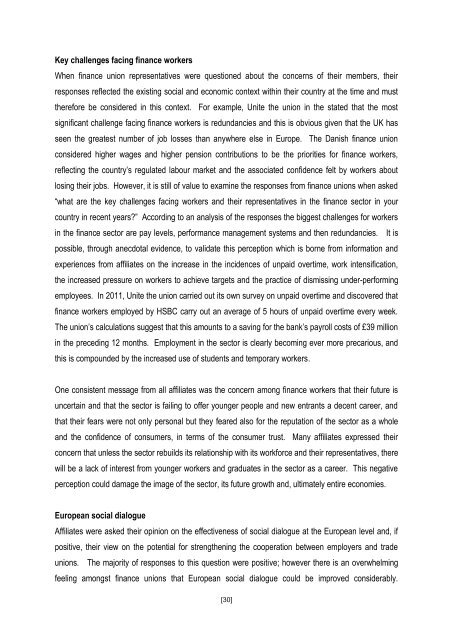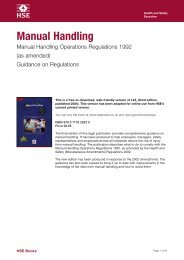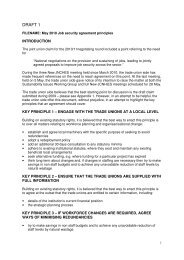Full report, English - Unite the Union
Full report, English - Unite the Union
Full report, English - Unite the Union
Create successful ePaper yourself
Turn your PDF publications into a flip-book with our unique Google optimized e-Paper software.
Key challenges facing finance workers<br />
When finance union representatives were questioned about <strong>the</strong> concerns of <strong>the</strong>ir members, <strong>the</strong>ir<br />
responses reflected <strong>the</strong> existing social and economic context within <strong>the</strong>ir country at <strong>the</strong> time and must<br />
<strong>the</strong>refore be considered in this context. For example, <strong>Unite</strong> <strong>the</strong> union in <strong>the</strong> stated that <strong>the</strong> most<br />
significant challenge facing finance workers is redundancies and this is obvious given that <strong>the</strong> UK has<br />
seen <strong>the</strong> greatest number of job losses than anywhere else in Europe. The Danish finance union<br />
considered higher wages and higher pension contributions to be <strong>the</strong> priorities for finance workers,<br />
reflecting <strong>the</strong> country’s regulated labour market and <strong>the</strong> associated confidence felt by workers about<br />
losing <strong>the</strong>ir jobs. However, it is still of value to examine <strong>the</strong> responses from finance unions when asked<br />
“what are <strong>the</strong> key challenges facing workers and <strong>the</strong>ir representatives in <strong>the</strong> finance sector in your<br />
country in recent years?” According to an analysis of <strong>the</strong> responses <strong>the</strong> biggest challenges for workers<br />
in <strong>the</strong> finance sector are pay levels, performance management systems and <strong>the</strong>n redundancies. It is<br />
possible, through anecdotal evidence, to validate this perception which is borne from information and<br />
experiences from affiliates on <strong>the</strong> increase in <strong>the</strong> incidences of unpaid overtime, work intensification,<br />
<strong>the</strong> increased pressure on workers to achieve targets and <strong>the</strong> practice of dismissing under-performing<br />
employees. In 2011, <strong>Unite</strong> <strong>the</strong> union carried out its own survey on unpaid overtime and discovered that<br />
finance workers employed by HSBC carry out an average of 5 hours of unpaid overtime every week.<br />
The union’s calculations suggest that this amounts to a saving for <strong>the</strong> bank’s payroll costs of £39 million<br />
in <strong>the</strong> preceding 12 months. Employment in <strong>the</strong> sector is clearly becoming ever more precarious, and<br />
this is compounded by <strong>the</strong> increased use of students and temporary workers.<br />
One consistent message from all affiliates was <strong>the</strong> concern among finance workers that <strong>the</strong>ir future is<br />
uncertain and that <strong>the</strong> sector is failing to offer younger people and new entrants a decent career, and<br />
that <strong>the</strong>ir fears were not only personal but <strong>the</strong>y feared also for <strong>the</strong> reputation of <strong>the</strong> sector as a whole<br />
and <strong>the</strong> confidence of consumers, in terms of <strong>the</strong> consumer trust. Many affiliates expressed <strong>the</strong>ir<br />
concern that unless <strong>the</strong> sector rebuilds its relationship with its workforce and <strong>the</strong>ir representatives, <strong>the</strong>re<br />
will be a lack of interest from younger workers and graduates in <strong>the</strong> sector as a career. This negative<br />
perception could damage <strong>the</strong> image of <strong>the</strong> sector, its future growth and, ultimately entire economies.<br />
European social dialogue<br />
Affiliates were asked <strong>the</strong>ir opinion on <strong>the</strong> effectiveness of social dialogue at <strong>the</strong> European level and, if<br />
positive, <strong>the</strong>ir view on <strong>the</strong> potential for streng<strong>the</strong>ning <strong>the</strong> cooperation between employers and trade<br />
unions. The majority of responses to this question were positive; however <strong>the</strong>re is an overwhelming<br />
feeling amongst finance unions that European social dialogue could be improved considerably.<br />
[30]
















